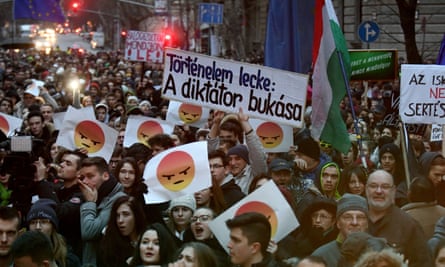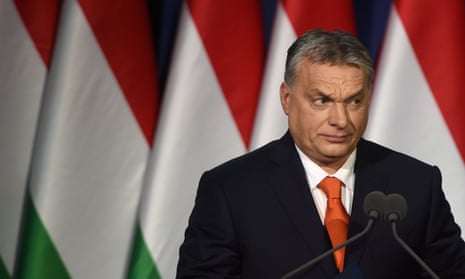At the moment, I don’t much like being Hungarian. In recent years I’ve started feeling that my nationality resembles a nasty skin disease that I want to scrub off. When I’m abroad, I hide my accent and I call myself a “world citizen”. I’ve vowed never to have a Hungarian boyfriend, or even to settle down in my own country. I hate the fact that much of the world now believes Hungarians to be intolerant and longing for authoritarianism. Not that long ago we were barely ever mentioned in the international media. Now, we’re a primary example of illiberalism in Europe.
Perhaps what I hate most is the way the Hungarian government tries to define what a “real” Hungarian should be. Orsolya Lehotai, an activist blogger and a high-school friend of mine, puts it this way: the prime minister, Viktor Orbán, has tried to force on us – the younger generation – a vision in which being Hungarian means “white, heterosexual, Christian or at least non-Muslim”. Orsolya likes to say she only comes from Hungary but isn’t Hungarian, because the word has been hijacked. I’ve started doing much the same.
It’s an irony that the government flirts with white nationalism, but then celebrates our Hungarian-Asian roots as a way of demonstrating ethnic uniqueness. “When we go to Brussels we do not have any relatives there. But when we come to Kazakhstan, we have close people here,” Orbán said on a 2015 visit to central Asia. The government has also allotted 300m forint (£850,000) to the Kurultáj festival, held every other summer to celebrate a “tribal assembly of Hun-Turkic nations”, with participants from 27 ethnic groups.
Hungarians are said to originate from somewhere east of the Ural mountains, beyond the line separating Europe and Asia. Experts still debate the location of our exact roots, but most agree that we came from somewhere in central Asia. Our ancestors were nomads, moving across large territories, shooting arrows backwards on horseback and practising shamanism. Towards the end of the ninth century we ended up settling in the Carpathian basin in central Europe.
What Hungarians call the Honfoglalás, or the conquest of the homeland, was essentially a migration-led process. That’s no small paradox when set against Orbán’s rabid anti-immigration rhetoric. In a recent speech he said: “We do not want to be a diverse country, we want to be how we [were] 1,100 years ago.”
My country’s relations with the EU have become dangerously fraught. Studies show that a majority of Hungarians trust the EU. Yet Orbán casts us as central Europeans under assault from Brussels. He accuses the EU of wanting to transform our region into “a migrant destination”. He’s suggesting that we single-handedly have the power to decide what is European and what isn’t.

I recently became more aware of the complexities that surround identity when I met Norbert Kulcsar, a manager in an agricultural store in the small south-eastern town of Kiskunmajsa. His brand of Hungarian patriotism comes with an enthusiastic nod to the distant Asian past. His wife, Bulgana, is Mongolian. Their home is decorated with objects that blend cultures: handmade leather quivers; an engraved plaque depicting horses; and a T-shirt Norbert likes to wear depicting a map of pre-world war one “Greater Hungary”. “People in the west see Hungarians as easterners,” he says, “but in the east we are westerners.” A regular visitor to the Kurultáj festival, Norbert says he wouldn’t be surprised if some of his ancestry traced back to Mongolia.
Perhaps how we define ourselves is something that evolves constantly. Hungary is in fact a diverse nation. A cocktail of German, Slav, Turkish and other Eurasian cultures surely runs through most of us. Many of our most treasured traditions – such as the Busó carnival marking the end of winter, or the kürtőskalács, a cake made of sweet yeast dough and roasted over charcoal – are inherited from peoples we interacted with throughout our history. Just as during our migration from Asia, different cultures, people and languages today form a melting pot, one that the government denies even exists.
Hungary is heading towards elections on 8 April. Its politics have been made toxic as a result of manipulations over identity. Ours is a multicultural past, one of long-distance migration and the mixing of people that came with successive empires. In the 19th and 20th century, large numbers of Hungarians uprooted themselves to seek better fortunes elsewhere in Europe or in America. None of this has prevented the government from erecting barbed fences to ward off asylum seekers in 2015, nor from plastering giant billboards across the country proclaiming what “real and good” Hungarian citizens should be, with the rest being depicted as “traitors”.
Extreme nationalism revolves around exclusion and scare tactics. It is not only making Hungary a pariah in Europe, it is also scaring away the progressive part of the younger generation. Many are tempted to simply pick up their bags and leave. Some studies show that more than 370,000 young Hungarians are planning to emigrate in the coming years.
Most young Hungarians have a positive image of the EU, not the paranoid vision presented to us by government propaganda. Many of us are fed up with watching the current regime portray us as a nation that’s victimised and which needs to stand up to the European “system”.
Young people need to get more involved in politics, so others don’t make all the decisions for them. They should also become more aware of how human rights and democracy – not just job opportunities and freedom of movement – are deeply intertwined with Hungary being part of the EU. After the borders opened in Europe in 1989, our parents’ generation embraced the transformations that became possible. Now we are watching walls being erected again. I refuse to believe this is what we are about. One day we will acknowledge that we ourselves are a mixture of accumulated identities – we will break out of the siege mentality and accept differences. We can be proud again of being Hungarian.
